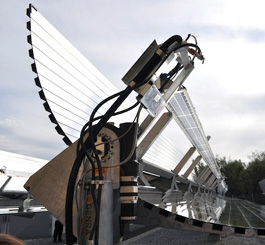home | north bay bohemian index | features | north bay | green zone

Heat Waves
Solar thermal energy comes to Graton
By Juliane Poirier
"Solar thermal is the next wave," says Natasha Granoff of the Sonoma Wine Company. "You just have to look at the way solar thermal is being used in Europe and Asia." According to Granoff, photovoltaic (PV) methods of solar energy are "really sexy" but "not that efficient." As Sonoma Wine's business development director, she knows that efficiency is smart and profitable.
Their new solar thermal system, installed by Cogenra Solar, heats water to 165 degrees Fahrenheit for the routine cleaning of wine tanks and washing of barrels. The company will now reduce its payments to PG&E for natural gas by an estimated 35 percent. They've reduced their water consumption, and the solar thermal system now prevents an estimated 120 metric tons of CO2 annually from being released into the atmosphere. That's about 20 percent of their annual greenhouse gas emissions.
"The Cogenra project just fell into our laps," explains Granoff, who says the company had solicited bids for a PV system as far back as 2003 but opted instead to follow advice from consultant John Garn, who warned them not to fall into a common trap of "solarizing their inefficiencies." Simply buying a solar system, Garn explained, does not a sustainable business make.
Luckily, Granoff didn't rush into buying a PV solar system. The company first took stock of how much water and energy it used, and how it was used. Working with environmental engineer John Rosenblum on efficient water management, including rainwater capture, the idea of solar thermal came along. "John introduced us to the Cogenra people," explained Granoff, "and we really liked them and what they proposed to do. The appeal was multifold. It addressed our hot water needs and combined PV. It's a nice cogeneration hybrid system."
Cogenra Solar maintains and operates the solar-thermal system and receives the rebates from PG&E. "The deal will offset an estimated 45 percent of our gas use," explains Granoff, "and 10 percent of our electrical."
Co-generation, which captures lost heat for reuse, is an energy-efficiency concept that has been commercially viable for years. But it's relatively new to the wine industry, being site-specific and most effective at sites that use a significant amount of hot water, such as apartment buildings.
Granoff is a solar thermal advocate now. "PV cells lose energy to heat," she says. "The hotter the cells get, the less efficient they become. And they degrade. But the elegant simplicity of the solar-thermal system is how they put it together and capture that lost heat. We shouldn't just give up all this heat to the atmosphere."
Well said.
See www.cogenra.com or www.sonomawineco.com.
Send a letter to the editor about this story.
|
|
|
|
|
|